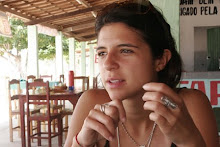The women in my family love bananas. I am not sure exactly why. I realized this when editing the photos from my last visit home this past January. There are so many photos that show bananas! This realization got me thinking... yes it is true - bananas are an integral part of my family's table. We eat them at breakfast, at lunch, in the afternoon snack and even at dinner (in the form of a dessert called doce de banana).
Each woman has a very specific way to approach this fruit. My grandmother, for example, is very particular about how one should and should not touch her bananas. She is known for her doce de banana (adored my many) but she will will only make this dessert when she can find "proper" bananas for it (perhaps it's a good thing she has never seen the bananas we get abroad). She will go unimaginable lenghts to get the bananas she is comfortable cooking with, even pretending to befriend people she absolutely despises just so she can have access to their precious banana plants.
In June and July we celebrate Festas Juninas in Brasil. These are the parties for Saint John, Saint Anthony and a few others that I honestly don't remember (does this make it obvious how un-religious I am?). During these festivities, young women perform very traditional divination games, the kind to do when you want to know what the future holds for you. It's things like blurbing some sayings at the same as you're dripping some candle wax in a bowl of water with some spices, then reading the first letter of the name of the future husband on the wax. It's also things like poking a peixeira (very very large knife everyone carries around in the Northeastern countryside) through the banana tree, which supposedly also has divination qualities. The tree is very moist inside. This moisture grabs onto the blade and on this blade one can see the face (or the first letter of the name, or whatever one may believe to see) of the future husband.
I am curious to discover more about the origins of such relationship between the women of this tiny corner of the world and bananas (ooh! that didn't sound right). But in all seriousness, there is a very intimate connection between people from rural Brasil (and rural parts of the world in general) and food. In my grandmother's home, each thing that goes in your mouth is in there for a reason. There is a preocupation with where this food came from, whether it is a quality item, whether it's at the right moment to be eaten, and what it does to your body. The older women in my family don't have all the answers, but, in paying attention to each banana that is consumed, for example, one can understand and participate so much more in the culture and society in which she inhabits.
Food is not only about sustaining the body. In fact, I believe that's far from being its most important quality. Food is about relationships. Relationships between people, between people and their environment, between people and the perfume of life. People who have no relationship with their food also lack involvement with the very elements that make us human. Human culture is not consumer culture. Traditionally, we are eaters, not buyers. We produce (or find) and share our food. A very dangerous disconnect exists in households where more and more industrialized foods are consumed in place of "real foods." A decline in everything that is good and wholesome stems from the increased development of a relationship between people and industry, not between people and food, or people and people. The examples are everywhere and are especially visible in the so-called "industrialized, developed" nations. One just needs to open her eyes to be able to see.









